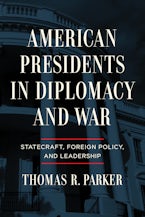The Vietnam War provides a useful example of a failure by successive leaders to understand a complex situation. The origins of the war went back to 1947, when President Truman rallied American public support for military and economic aid to Greece and Turkey and, by extension, to any country threatened by communist outside pressures. This position was buttressed by the famous article the same year on containment in Foreign Affairs, “The Sources of Soviet Conduct,” by the U.S. diplomat George Kennan, who argued that Washington should oppose Soviet expansion. These were laudable as general principles, but as the journalist Walter Lippmann pointed out, the sweeping containment policy risked overcommitting the U.S. to defending weak regimes where Washington was at a comparative disadvantage. Moreover, George Kennan himself began to qualify the implementation of the containment doctrine by saying that he had never meant that U.S. assistance always required a military component. In short, distinctions needed to be made.
Indeed, there were many reasons to be skeptical about the prospects for U.S. success in South Vietnam. Prime Minister Winston Churchill turned aside a U.S. request to help France in Indochina in 1954 and warned U.S. officials of “war on the fringes, where the Russians were strong [because they could offer assistance and sanctuaries to the North Vietnamese] and could mobilize the enthusiasm of nationalist and opposed peoples.” Churchill thought it best to defend Southeast Asia at the borders of Malaya (as Britain successfully did in its counter-insurgency campaign in the 1950s). The U.S. would help Thailand to defend itself in the 1960s.
There were other reasons to avoid intervention, in addition to Churchill’s warnings about nationalism and the proximity of North Vietnam to Russia and China. Vietnam’s terrain with its lush vegetation favored the Vietcong insurgents and worked against U.S. conventional forces with their dependence on airpower and artillery. The communist regime also had mobilized both the entire population of North Vietnam and the Vietcong guerrillas in South Vietnam. U.S. policymakers also failed to learn from the France’s military defeats in Vietnam in the 1950s. Overconfident U.S. leaders failed to discuss at length either these comparative disadvantages or the history of the intervention by the French.
Finally, Professor Hans Morgenthau of the University of Chicago, one of the pioneering writers on realism and foreign policy in the mid-20th century, went further by pointing out that the stakes were not that important in South Vietnam. After all, a united communist Vietnam would remain independent of China, given the historical rivalry between the two countries. Indeed, China and Vietnam engaged in a border war within several years of unification in the 1970s and Vietnam remains an important partner of the United States in the loose coalition of East Asian countries opposed to Chinese expansion.
Nor did U.S. policymakers step back from the discussion about a South Vietnam commitment to evaluate the bigger picture of America’s comparative position in the Cold War rivalry. A more nuanced assessment might have gone along the following lines: the long struggle between the non-communist and communist worlds would probably involve some losses by both sides. (Cuba, for example, would become a Soviet gain and Yugoslavia a Soviet loss during the early Cold War period). Overall, however, the U.S. position was reasonably solid, given the strong desire of many countries to avoid Soviet domination, including even communist China. (One Cold War joke asked which was the only country surrounded by hostile communist states, to which the answer was the Soviet Union.) Given the relatively strong geo-political position of the U.S. and the internal weaknesses of the Soviet Union, the U.S. could afford to lose a country like South Vietnam if the prospects for successful intervention at a reasonable cost were poor.
In short, U.S. leaders failed to come to grips intellectually with the many reasons why the commitment to support South Vietnam would probably turn out poorly.

